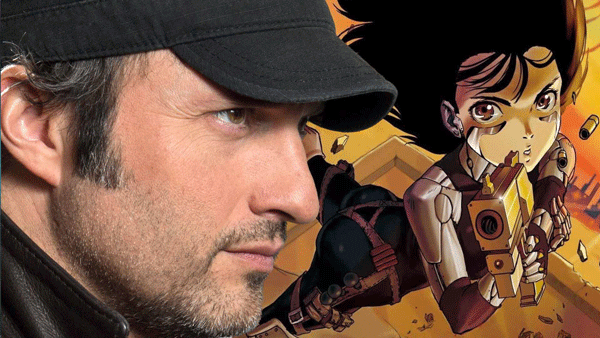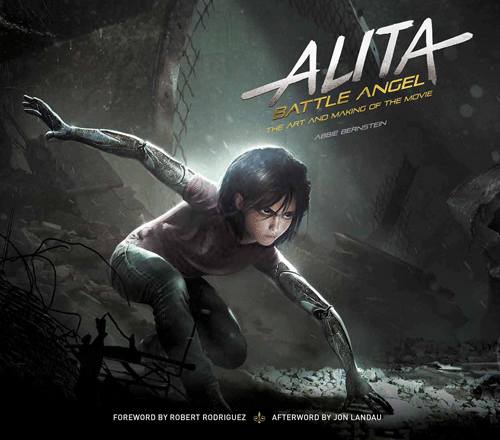
All About Alita
Coming off disappointing sequels for his Sin City and Machete projects, Robert Rodriguez has returned to invigorating form with a spritely cyberpunk fantasy. The director’s obvious gift for cinematic grafting has resulted  in a PG-13 adaptation of the Manga classic Alita: Battle Angel, which owes as much to fact that James Cameron, who co-wrote the Alita script, could never get this story about an avenging earthbound cyber-angel off the ground.
in a PG-13 adaptation of the Manga classic Alita: Battle Angel, which owes as much to fact that James Cameron, who co-wrote the Alita script, could never get this story about an avenging earthbound cyber-angel off the ground.
Alita is set in the year 2563, centuries after a galactic war with Martian meanies has resulted in an extreme segregation on earth. After what the survivors call “the Fall,” only a select group of pampered people get to live the high life in an ethereal metropolis called Zalem. Beneath this sky city reside the scavenging rabble of wounded but often technically augmented denizens of Iron City.
Dr. Dyson Ido (Christoph Waltz), a cybernetics expert who blames himself for the death of his daughter, comes across a three-hundred-year-old cyborg with a still humming human brain. The grieving man, who palms through junkpiles for spare parts and moonlights curbing crime in this copless world of scanners and scammers, rebuilds the broken cyborg with the artificial body he had once intended for his own daughter. Once the cyborg is awake and aware, he gives her an orange as well as his dead daughter’s name. And thus begins a story that comes off like Prometheus meets Punky Brewster.
However desperately Dr. Ido wants to treat this refurbished robo-relic like a daughter, Alita is first and foremost a weapon, and one of those special superhuman weapons, like Diana Prince in Wonder Woman whose very existence might ensure global survival. Alita has a heart that can literally power the entire city, a torso that works best by being hooked up to an alien-built “Berserker” body, and every time she kicks cyborg butt she recovers a lost memory regarding her glorious “Great War” past.
weapon, and one of those special superhuman weapons, like Diana Prince in Wonder Woman whose very existence might ensure global survival. Alita has a heart that can literally power the entire city, a torso that works best by being hooked up to an alien-built “Berserker” body, and every time she kicks cyborg butt she recovers a lost memory regarding her glorious “Great War” past.
But beyond all the hidden history and Martian martial arts, Alita is also a girl -- a girl who is tasting chocolate for the first time and falling hard for the first boy who gives it to her. Alita’s involvement with a kid named Hugo (Keean Johnson), a young junk dealer who raids cyber parts while trying to escape from Zalem, provides this film with just enough romance to cushion the action scenes involving mechanical mercenaries and the possessed minions of an evil leader named Nova.
Alita relies heavily on the theme of renewal amid refuse; little wonder, then, that the film recycles visual elements from movies as well-known as Star Wars and as obscure as Solarbabies. There is also a Christopher Nolan feel to this noir-nuanced fantasy, wherein myths of the near future meet myths of opportunity for the oppressed avatars who are suffering on screen. And, as in all of these techno gladiator-type tales, the old time amenities of booze and violent sport -- in this case, a kind of Robocop-looking roller derby called Motorball -- still remain.
In this world of android trash and abandoned alien technology, the character of Alita stands out as the most Manga-looking element in the entire film. Played with a fierce felicity by Rosa Salazar, Alita is a comforting visual  challenge to viewers. With oversized eyes that pay homage to the style of the Japanese comics that inspired the film, and the kind of cartoonish agility that belongs in a video game, Alita is much more than just a sentient set of comely cybernetics.
challenge to viewers. With oversized eyes that pay homage to the style of the Japanese comics that inspired the film, and the kind of cartoonish agility that belongs in a video game, Alita is much more than just a sentient set of comely cybernetics.
For a film aimed at a young adult crowd, there are an awful lot of cinematic and socially-aware asides occurring---from the way one of Alita’s antagonist, Grewishka (Jackie Earle Haley), resembles nothing less than a battle droid version of Harvey Weinstein to the way that Dr. Ido is played by the actor who portrayed Walter Keane in Tim Burton’s Big Eyes; standing before a cyborg-daughter that looks uncannily like one of those kitsch Keane waifs, the reference is too obvious to seem unintentional. So too is the fact that Alita, who represents the hopes of an oppressed underclass on Earth, has the number 99 (as in the “We are the 99%” slogan) chalked on her arm before battling cyborgs under the direction of an evil elite.
There is a refreshing lack of threat in Alita. The audience wants to see the good guys win, of course, but in this future fantasy where a three-hundred-year-old heroine can be pulled out of junkpile and coaxed into high-stakes roller derby, we suspect that everyone will somehow make it out alive. The point is to not let any philosophizing get in the way of enjoying this visually arresting live action Anime. Though it’s over-saturated by all the digital trickery and adroit allusions that Robert Rodriguez fans have come to expect, Alita wins our affections by respecting our entitlement to the pure pleasures of superficial sci-fi spectacle.
Roberto Ontiveros